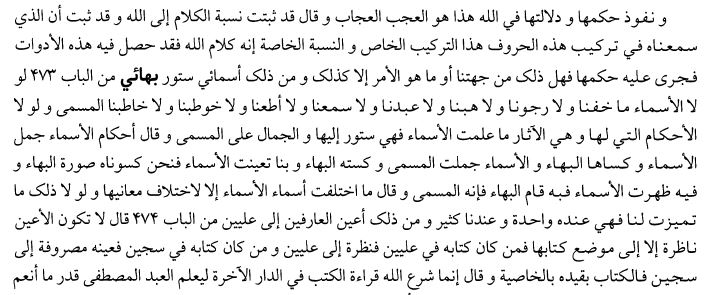
The word Baha' in emergent Sufism and Islamic mysticism.
Preliminary Notes
Stephen Lambden UC Merced.
In Progress. Last updated 24-07-2018.
Ahmad ibn `Ali, Muhyī al-Dīn, al-Būnī (d. Cairo, 633/1225 CE)
Another stunning, and for Bahā'īs prophetic, occurrence of the word bahā' in a mystical text, is its use in the work Shams al-ma`ānī ("The Sun of Mystic Meaning") of Ahmad ibn `Ali, Muhyī al-Dīn al-Būnī (d.1225 CE) where it is written in the course of commenting on "the name Bahā' ("Glory/Splendour");
"God will cause a sunbeam (ishrāq an) to radiate from His splendid (al-bahiyy), all-glorious (al-abhā') Countenance (al-wajh) with the name of Bahā' (bi-ism al-bahā') on the Universal Day (yawm al-mutlaq). And He shall enter the meadow (or vicinity, marj) of Akkā' and unite all the peoples of the earth.." (cited Ishraq Khavari, Rahiq al-makhtum 1:365-6). [27]
This particular work, of the forty or more works of al-Búní, is not available to me. I have translated the text cited as being from this text in `Abd al-Hamid Ishráq Khávarí's Rahiq al-makhtum. A much better known work of al-Búní is his Kitáb shams al-ma`árif wa laá'if al-awárif ("The Sun of Gnosis..") which exists in various recensions and has several times been printed.
Muhammad ibn ʿAlī ibn Muhammad ibn al-ʿArabī al-Ḥātimī al-Ṭāʾī, Muhyī al-Dīn ibn al-`Arabī (560/1165-638/1240),
The `Great Shaykh', Muhyī al-Dīn ibn al-`Arabī (d. Damascus, 638/1240), in his magnum opus, the lengthy Meccan Revelations (Openings; al-Futūhāt al-Makkiyya) -- partially orally commented upon by Bahā'u'llāh during his two year sojourn in Sulaymānīya (1854-56; see GPB: 122) -- occasionally uses the word bahā' or a related derivative of the same Arabic root. In, for example, Futūhāt chapter 65, on the `Gnosis of Paradise', there is reference to the appearance of God unto certain inmates of Paradise. In the course of a Divine colloquy, mention is made of such as are angelically clothed with, or whose "faces" are radiant with, bahā' ("glory"), jamāl ("beauty") and nūr ("light"),
In his magnum opus, the lengthy al-Futūhāt (Meccan Revelations/ Openings) the great Shaykh occasionally uses the word bahā’ or a related derivative of the same Arabic root. In for example, al-Futūhāt chapter 65, on the `Gnosis of Paradise', there is reference to the appearance of God unto certain inmates of Paradise. In the course of a Divine colloquy, mention is made of such as are angelically clothed with, or whose "faces" are radiant with, bahā' ("glory"), jamāl ("beauty") and nūr ("light").
Towards the end of the massive four volume al-Futuhat there is a lengthy, over 100 page last but one section, number 559 (= al-Futuhat 4: 326-444), which is decribed as `On the gnosis of the mysteries and the realities (ma`rifat al-asrar wa'l-asrar) repecting diverse waystations (manazil mukhtalafa)'. Here the words baha'i (my baha') and al-baha' occur several times (vol.4:419)...

`Abd al-Qadir Jīlānī (d.1165 CE)
In a lengthy prayer (alāt al-kubrā) contained in the volume entitled Lordly Graces (Fuyūdāt al-Rabbānī..) ascribed to `Abd al-Qadir Jīlānī (d.1165 CE), the founder of the Qadirī Sufi fraternity, the Prophet Muhammad is called al-nūr al-bahiyy ("the glorious light") (refer, Jīlānī, Fuyūāt.. 148).
The Shi'īte Sufi `Abd al-Karīm al-Jīlī (d.c. 832/1428).
The Shi'īte Sufi `Abd al-Karīm al-Jīlī (d.c. 832/1428) in the prolegomenon to his important al-Insān al-kāmil.. ("The Perfect Man..") refers to God as being clothed in both "glory and splendour" (al-majd wa'l-bahā' ( Insan vol. 1:4).



